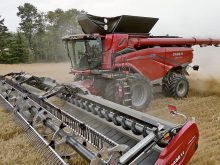A Canadian Wheat Board program that allowed producers to trade delivery opportunities with each other is no more.
The Delivery Exchange Contract (DEC) was designed to give producers increased delivery flexibility, more control over their individual cash flow and guaranteed acceptance.
The wheat board introduced it on a limited basis in 2006-07 and then offered it to all producers the following year.
However, it never attracted much interest and is no longer available.
In its first year, when it was offered on a pilot basis in southern Saskatchewan, 125 producers signed up, delivering 71,200 tonnes of grain and executing only one trade.
Read Also

The Organization for Economic Co-operation and Development lauds Canada’s low farm subsidies, criticizes supply management
The Organization for Economic Co-operation and Development lauded Canada’s low farm subsidies, criticized supply management in its global survey of farm support programs.
In 2007-08, 38 producers signed up 18,100 tonnes, while in 2008-09 it dipped to only seven producers and 6,375 tonnes.
The program was cancelled at that point, and participating producers were rolled into the board’s new GrainFlo program.
“It just didn’t catch on,” said Matt Kjarsgaard, manager for farmer registration and delivery programs, who added it was difficult to put trades together.
Under the DEC, a farmer would take out a contract that would be divided into four equal amounts over four delivery periods during the crop year.
Contract holders would indicate how much they wanted to deliver in each period and their willingness to trade with another producer for a different period.
The two could then negotiate whatever arrangements they wished to swap delivery opportunities.
Kjarsgaard said the DEC was in a sense the precursor for the much more successful GrainFlo, introduced in 2008-09, which offers producers a choice among four delivery periods without the trading.
CWB director Rod Flaman, who had championed a delivery trading contract for years, said the decision to cancel the program makes sense.
With only a couple of hundred farmers participating, it wasn’t enough to justify continuing with it.
“You throw something out there and see if producers want to use it,” he said.
“If they don’t, there’s no use beating a dead horse.”
GrainFlo is a good alternative, he added, although it doesn’t offer the individual control that the trading contract did.
He said one of the problems with the DEC was that most farmers wanted to trade for an earlier delivery opportunity.
“There was no shortage of people who wanted to deliver early,” he said.
“Trying to match them up with someone who wanted to deliver later was difficult.”














